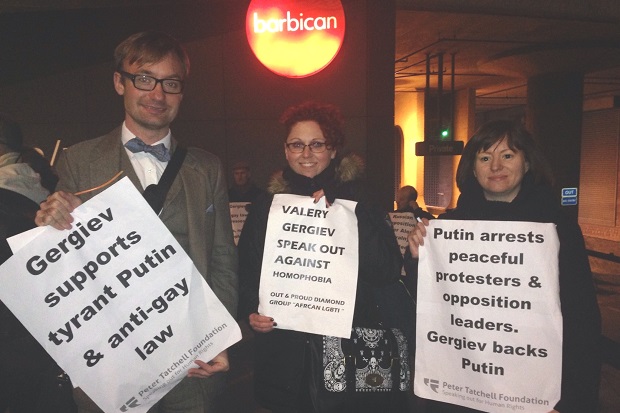For a moment I thought someone had spiked my tea with LSD. With escalating levels of disbelief, I read Melanie McDonagh’s bizarre account of last Thursday’s protest at the Barbican against the pro-Putin Russian conductor Valery Gergiev. Then, as her article became ever-more divorced from reality, I wondered if perhaps she had been the victim of an acid prankster.
Melanie is usually a fine writer. What prompted her to scribble such tosh? She lambasts the ‘barracking’ and ‘bullying’ of Gergiev, describing him as a ‘Russian composer’. Actually, he’s a conductor and he was nowhere in sight that evening. We were on the pavement outside, not in the ‘concert hall’.
It was a small, good-natured, peaceful protest. We held placards and waved sparklers. Hardly a menacing mob. True, we shouted ‘Shame’ and ‘Gergiev! Stop supporting Putin. Stop supporting tyranny.’ But does this really amount to ‘bullying’ the maestro? It was certainly not the ‘sustained and disruptive harassment’ alleged by Melanie. No concert was interrupted and no audience members were prevented from accessing the Barbican.
It is true that a week earlier I walked on the stage on the opening night of the new London Symphony Orchestra Berlioz season. I made my entrance before the performance had started and Gergiev wasn’t there. After a polite 60 second critique of his pro-Putin stance, I left — mostly to applause. Some of the audience may have been applauding my departure but others seemed genuinely supportive of what I had said.
Melanie says Gergiev has ‘made clear that he is not prejudiced about gay people’. I agree and commended him for saying this. But I also pointed out that although he doesn’t discriminate, he supports a Russian president, Vladimir Putin, whose regime does discriminate against gays and lesbians.
We are told by Melanie that it is his own business if Gergiev backs Putin. The implication being that it is none of our business. This is tantamount to saying that supporters of tyrants should get a free ride; a bit like saying people should have not protested against the defenders of the Soviet and apartheid regimes.
In a further leap towards the realm of fantasy, Melanie insinuates that we were trying to stop Gergiev performing freely in the UK. Not true. We have not called for him to be banned or interrupted his performances. Melanie queries why I have attacked the new Russian anti-gay law when, she claims, homophobic ‘Arab states’ have never got the ‘Tatchell treatment’. This is plain daft. For three decades, I’ve campaigned against all human rights abuses (not just anti-gay abuses) by Arab leaders, including by those in Saudi Arabia, Bahrain, Egypt, Syria, Palestine and Algeria.
Melanie comes close to defending the new Russian anti-gay law, misleadingly describing it as being about ‘child protection’. She seems to echo Gergiev’s false claim that it is solely concerned with stopping child sex abuse. In September, the Dutch newspaper, Volkskrant, quoted him as stating: ‘In Russia we do everything we can to protect children from paedophiles. This law is not about homosexuality, it targets paedophilia.’
Such a claim is blatantly untrue. The new law criminalises actions or words that make homosexuality sound ‘interesting’ or ‘attractive’, or that suggest homosexuality and heterosexuality are equally valid — in circumstances where this may be witnessed by a person under 18. Why shouldn’t young Russians know the facts about same-sex love and Tchaikovsky’s homosexuality? Moreover, this law prevents gay Russians under 18 from receiving affirmative counselling and safer sex advice, which puts them at greater risk of suicide and HIV.
Already, the new law has been cited to sack teachers for no other reason than because they are gay. It’s also been used to convict people for saying homosexuality is ‘normal’, even where there is no evidence that someone under 18 witnessed it.
Our protest was not about ‘officious Englishmen’ telling Russians they must reform their laws. It was in defence of the Russian constitution against a law that violates its guarantees of equal treatment and freedom of expression. We were protesting in solidarity with gay and straight Russians who have asked for global protests against Gergiev, Putin and the anti-gay law. We were supporting them, in the same way that many of us supported persecuted dissidents during the Soviet era.
I defend the right to protest, including the right of others to protest against me. I’ve defended anti-gay Christians against prosecution and given over my podium to disruptive critics to let them have their say. I’m saddened that Melanie McDonagh doesn’t seem to understand that the right to protest is also for those we disagree with. Even sadder, she’s chosen to make more of a fuss about our brief peaceful protest than about the sustained assault on democracy and human rights by the Russian regime. A case of misplaced moral priorities, in my view.
Peter Tatchell is the Director of the Peter Tatchell Foundation.






Comments